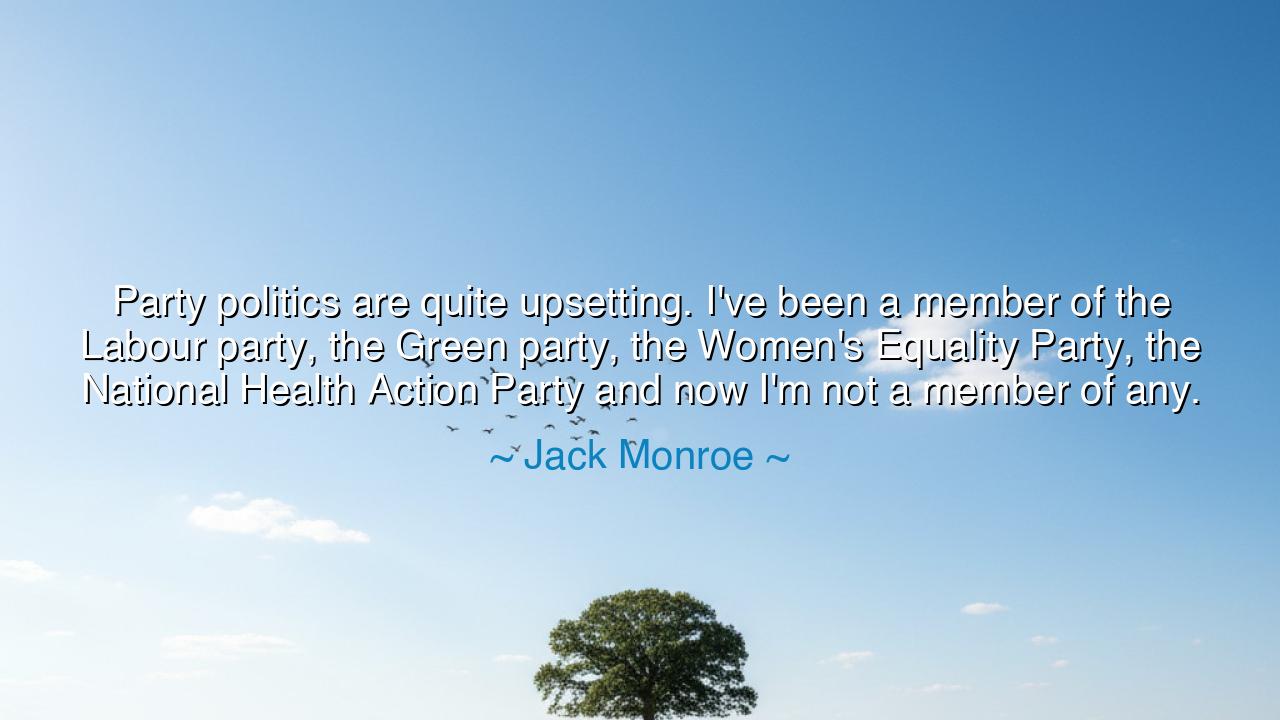
Party politics are quite upsetting. I've been a member of the
Party politics are quite upsetting. I've been a member of the Labour party, the Green party, the Women's Equality Party, the National Health Action Party and now I'm not a member of any.






Hear the weary yet honest voice of Jack Monroe, who said: “Party politics are quite upsetting. I’ve been a member of the Labour Party, the Green Party, the Women’s Equality Party, the National Health Action Party, and now I’m not a member of any.” In these words lies not the disillusionment of a cynic, but the lament of one who has searched too deeply for truth in the shifting sands of ideology. Monroe’s confession speaks for many who have walked the long road of political faith, only to find that every banner, though raised in righteousness, casts its own shadow. The tone is not one of bitterness, but of clarity — the understanding that the human heart cannot pledge itself wholly to any structure built by men, for all such structures are flawed.
In the ancient world, the wise saw politics as both necessity and burden. They knew that the governance of nations was never pure, for it was wrought by the hands of imperfect beings. Jack Monroe, an activist and writer known for fighting poverty and injustice, embodies that same ancient struggle — the yearning for justice within a system that too often forgets compassion. Her words reflect the sorrow of one who has tried to believe, again and again, in the promises of parties and movements, only to find that power has a way of dulling the very virtues it claims to serve.
In her journey through Labour, Green, Women’s Equality, and Health Action, we see a pilgrimage through ideals — equality, sustainability, fairness, and care. Each represents a sacred principle, a fragment of the whole truth. Yet to hold one alone is to risk blindness to the others. Like the parable of the blind men and the elephant, each touches a part and declares it the whole. Monroe’s withdrawal from all parties, then, is not an act of retreat, but of awakening. She has seen that no party owns justice, no movement holds the monopoly on goodness, and that moral clarity often lives beyond the walls of institutions.
History has known many such souls — seekers who could not be bound by one banner. Think of Marcus Aurelius, the philosopher-emperor, who ruled with a stoic heart and mistrusted the vanity of politics, preferring virtue to rhetoric. Or George Orwell, who fought for the left yet warned against the corruption of ideology, saying that when truth becomes the property of a party, it ceases to be truth. Monroe’s words rise in that same tradition: the recognition that ideals are eternal, but parties are temporal; that the cause of humanity must not be confined to the boundaries of political allegiance.
When Monroe says, “Party politics are quite upsetting,” she speaks to the weariness of those who have seen division replace dialogue, and slogans drown out sincerity. For what began as the noble art of governance has, in many places, become the theater of pride — where people fight for victory more than for virtue. It is upsetting indeed, not because politics is evil, but because it could be so much more. Her lament is thus a moral cry — that we must remember why politics exists: to serve the common good, to lift the weary, to protect the vulnerable.
Yet within her disappointment lies also a quiet hope. In leaving the parties, Monroe does not abandon her principles; she reclaims them. She reminds us that activism does not require a membership card, and that moral courage is not granted by any organization, but born in the heart of the individual. Just as Diogenes walked through the streets of Athens with a lantern, searching for an honest man, so too does the modern reformer walk through a landscape of parties, searching for integrity. Sometimes, to find it, one must stand apart.
Let the lesson, then, be carried forward: do not confuse belonging with believing. A party may guide you, but it must never own you. Seek truth wherever it dwells — in the policies of the left, the conscience of the right, the compassion of the center, or the silent wisdom of the apolitical. Judge each by its deeds, not its colors, for no flag is pure, and no ideology eternal.
And so, children of tomorrow, heed the teaching of Jack Monroe: participate in the world, but remain free within it. Serve justice, not factions; pursue empathy, not victory. For the highest politics is not the art of winning power — it is the art of keeping one’s soul uncorrupted while striving to make the world more just, more kind, and more whole.






AAdministratorAdministrator
Welcome, honored guests. Please leave a comment, we will respond soon